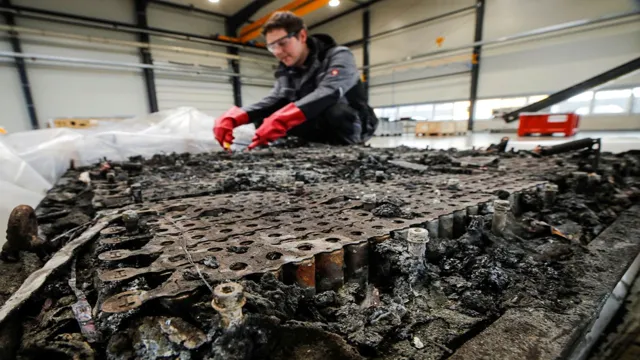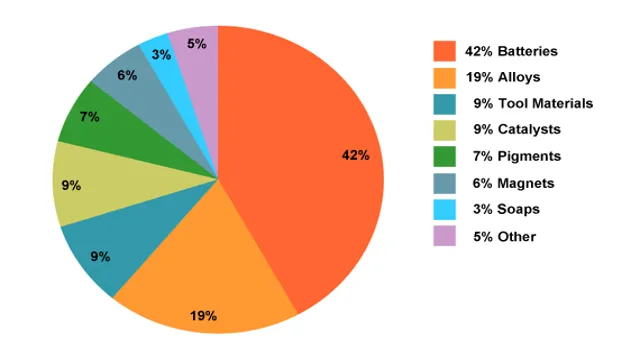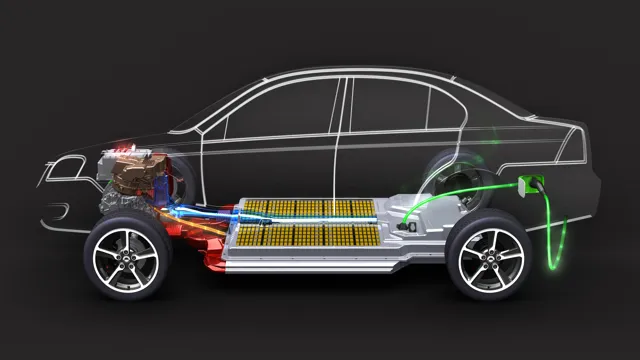Revolutionizing Eco-Friendliness: The Safe and Sustainable Power of Electric Car Batteries
Have you ever wondered if electric car batteries are truly safe for the environment? With the rise of electric vehicles in recent years, it’s an important question to consider. While electric cars have many environmental benefits, such as emitting fewer greenhouse gases and reducing our dependence on fossil fuels, their batteries are a point of concern for some people. So, what’s the verdict? Are electric car batteries truly environmentally friendly? Let’s delve in and find out.
Electric car batteries are designed to be much cleaner than their gasoline counterparts. They don’t emit any harmful pollutants or toxic chemicals when they’re in use. Additionally, they can be recycled or repurposed once they reach the end of their life, which reduces waste and helps to conserve resources.
So, all of this sounds great, right? But what about the production process? The production of electric car batteries does have an environmental impact. The mining of the metals used in these batteries, such as lithium and cobalt, can have negative effects on local ecosystems and communities. However, efforts are being made to source these materials in a more sustainable and socially responsible way.
Overall, it seems that electric car batteries are a step in the right direction for the environment. While there are certainly areas for improvement, they offer a cleaner and more efficient alternative to traditional gasoline-powered vehicles. As technology continues to progress and sustainability becomes more of a focus, we can expect electric car batteries to become even more environmentally friendly.
Emissions from Gas-Powered Vehicles
One of the biggest concerns with gas-powered vehicles is the emissions that they release into the air we breathe. These emissions can be harmful to both human health and the environment. However, with the rise of electric cars powered by battery technology, this concern has been alleviated.
Electric car batteries produce zero emissions, making them a much safer and cleaner alternative to traditional gas-powered cars. In fact, choosing an electric car powered by a rechargeable battery could significantly reduce your carbon footprint, helping to make the air we breathe much cleaner and safer for everyone. So why not make the switch to an electric car today and start enjoying the many benefits they have to offer?
Impact on Air and Health
When we think about the impact of gas-powered vehicles on air and health, the first thing that comes to mind is emissions. These emissions contain harmful chemicals like carbon monoxide, nitrogen oxides, and volatile organic compounds. When released into the air, these chemicals can cause a range of respiratory illnesses, like asthma and bronchitis, and can even lead to heart disease and premature death.
Additionally, emissions from gas-powered vehicles contribute to the formation of smog, which can exacerbate these health issues. So, what can we do to combat the negative impact of emissions from gas-powered vehicles? One solution is a switch to electric cars or other modes of transportation, as they produce zero tailpipe emissions. Another option is to use public transportation, bike, walk, or carpool whenever possible to reduce the number of gas-powered vehicles on the road.
Implementing these changes can go a long way in reducing the negative impact of emissions on air quality and public health.

Carbon Footprint and Climate Change
Gas-powered vehicles are significant contributors to carbon emissions and climate change. The combustion of gasoline in the engine produces carbon dioxide and other harmful gases that are released into the atmosphere. These gases trap heat in the Earth’s atmosphere, leading to global warming and its devastating effects.
According to the Environmental Defense Fund, transportation accounts for 29% of all United States greenhouse gas emissions, with the majority coming from cars, trucks, and buses. The good news is that people can make a difference by switching to more environmentally friendly vehicles such as hybrid, electric, or cars that run on alternative fuels such as biofuels or hydrogen. In addition, taking public transportation, carpooling, or biking and walking can significantly reduce carbon emissions from transportation.
By making conscious decisions about our transportation choices, we can help mitigate the negative impact of gas-powered vehicles and work toward a cleaner, healthier planet.
Electric Car Batteries
Electric car batteries have become increasingly popular in recent years due to the concern over emissions and the desire for a safer environment. Unlike traditional gasoline-powered vehicles, electric cars emit zero exhaust fumes which can pose health risks to both humans and animals. Electric car batteries use rechargeable lithium-ion batteries, which are much safer and more sustainable than traditional lead-acid batteries.
These batteries also have a much longer lifespan, meaning they can last for several years without needing to be replaced. Additionally, electric cars can be charged at home or at charging stations which use renewable energy, making them a more sustainable transportation option. Overall, electric car batteries offer a solution to the problem of emissions and air pollution while also providing a safer and more environmentally-friendly transportation option.
Minimal Emissions During Use
When it comes to minimal emissions during use, electric car batteries are leading the way in reducing carbon footprints. Unlike traditional gas-powered vehicles, electric cars draw power from their batteries and motors instead of combustible fuel. This means that they emit zero emissions during use, resulting in cleaner air and a healthier environment.
Additionally, electric cars are much quieter than traditional cars, reducing noise pollution and making for a more pleasant driving experience. Of course, the source of electricity used to power the batteries plays a role in overall emissions, but as more renewable energy sources become available, electric cars will become an even cleaner mode of transportation. By choosing an electric car, drivers can help reduce carbon emissions and contribute to a more sustainable future.
Concerns About Battery Production
Electric car batteries are a crucial component in the transition towards a greener future. They are the power source for electric vehicles and can help reduce greenhouse gas emissions. However, concerns about battery production have emerged due to their environmental impact.
The batteries use rare and limited resources such as cobalt and lithium, which are mined in countries with poor labor practices. Mining activities also cause environmental damage, including deforestation and pollution. Furthermore, the manufacturing process of the batteries requires a lot of energy, contributing to carbon emissions.
To address these concerns, efforts are being made to develop batteries using more sustainable materials, such as recycled metals and solid-state designs. In addition, recycling programs are being developed to recover valuable materials from used batteries. While electric car batteries hold great promise in reducing emissions, it is essential to consider their environmental impact and work towards more sustainable production processes.
Disposal and Recycling
Electric Car Batteries are the powerhouse of your electric car, but what happens to them once they reach the end of their useful life? These batteries will eventually need to be disposed of or recycled, but the process can be complex. Disposing of electric car batteries improperly can have dangerous environmental consequences. Fortunately, many electric car manufacturers are stepping up to address this issue.
They are investing in battery recycling programs that ensure that batteries are safely disposed of and that valuable materials are recovered. These programs help reduce the environmental impact of electric cars, making them a more sustainable option for the future. So, next time you’re considering an electric car, remember that the batteries that power it are a critical component for disposal and recycling – a responsibility that electric car manufacturers take seriously.
Breathing Easy with Electric Cars
Electric car batteries emit significantly less harmful emissions than traditional gasoline-powered vehicles, making the air we breathe safer and cleaner. As the world becomes more conscious of the impact of carbon emissions on our environment, more people are turning to electric cars to reduce their carbon footprint. In addition to being better for the environment, electric cars also provide a quieter and smoother ride.
The technology used in electric car batteries continues to advance, and the range and charging time of electric cars is improving rapidly, making them a more viable option for longer trips. By driving an electric car, not only are you making a positive impact on the environment, but you’re also ensuring that you and those around you are breathing easier and safer.
Reducing Air Pollution and Health Risks
Breathing easy with electric cars is becoming a new norm across the world as more people look for ways to reduce air pollution and health risks. The environmental benefits of electric cars are numerous. They emit fewer pollutants compared to conventional cars, which means less air and noise pollution.
Electric cars induce fewer greenhouse gas emissions, leading to a cleaner and greener environment. Moreover, they are cheaper to operate than gas-powered vehicles since they have lower maintenance and fuel costs. Imagine the peace of mind you’ll get knowing you’re doing your part to reduce the carbon footprint while driving a car that saves you money at the same time.
Plus, electric cars are quieter, and you won’t have to deal with conventional car issues like oil changes, transmission tune-ups, and noisy engines. With the increase in the number of charging stations nationwide, electric cars will become even more accessible and convenient for people who wish to contribute to a healthier planet.
Overall Environmental Impact Comparison
Electric cars are a green alternative to traditional gasoline-fueled vehicles. Not only do they emit zero tailpipe emissions, but they also have significantly lower environmental impacts throughout their life cycle. Electric cars contribute less to air and water pollution and have a smaller carbon footprint than gasoline vehicles.
Additionally, electric cars are more energy-efficient and require less energy to operate, further reducing their environmental impact. While the production of electric cars does require energy and resources, studies have shown that over time, the benefits of their use outweigh the initial environmental costs. Switching to electric cars can help us breathe cleaner air, reduce our reliance on fossil fuels, and create a more sustainable future.
Conclusion
In conclusion, electric car batteries are indeed a breath of fresh air compared to traditional fossil fuel engines. They emit significantly lower levels of harmful emissions, ensuring that the air we breathe remains safe and clean. So, let’s charge up those electric batteries and drive towards a brighter and more sustainable future!”
FAQs
How do electric car batteries impact emissions compared to traditional gasoline engines?
Electric car batteries have a much lower emissions rate than traditional gasoline engines due to their reliance on electricity, which can come from renewable energy sources.
Are electric car batteries safe for the environment?
Electric car batteries are safer for the environment than traditional gasoline engines due to their lower emissions and lack of toxic chemicals used in their production.
Do electric car batteries have a shorter lifespan than traditional car batteries?
While the lifespan of electric car batteries can vary, they generally have a longer lifespan than traditional car batteries due to their advanced technology and durability.
Are there any health risks associated with breathing in fumes from electric car batteries?
There are very low levels of emissions from electric car batteries, and it is unlikely that breathing in fumes from them would have any negative health impacts.






